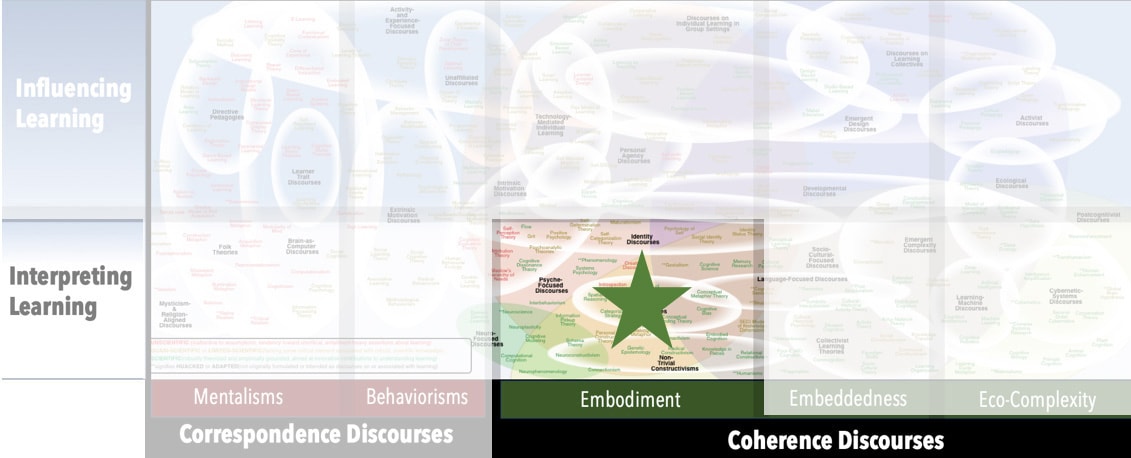The Medical Model of (Dis)Ability and Motivation Theories complement one another. The former address what learners can/can’t do, and the latter deal with what learners will/won’t do. A comprehensive analysis of the Medical Model of (Dis)Ability is beyond our interests and purpose, and so, in the elaborated entry, we offer brief summaries of the many, many contemporary discourses, categorized as “Models and Types of Intelligence,” “Types of Disabilities,” and “Types of Learning Disorders.”
Learn More...Eco-Complexity Discourses is a sub-category of Coherence Discourses. It is an umbrella term that reaches across perspectives on learning that refuse separations of human from nature, material from transcendent, and part from whole. Across Eco-Complexity Discourses, learning is understood as synonymous with evolution.
Learn More...Embodiment Discourses comprise perspectives on learning that refuse a separation of mental and physical. Mental and physical are understood as integrated and inseparable aspects of the body. Phrased differently, the body is not seen as something that a learner learns through, but as the learner. Correspondingly, behaviors are not seen as goals or indications of learning, but as integral elements of learning.
Learn More...Modularity of Mind asserts that the brain has a modular structure. Opinions vary on the extent of its modularity, but they tend to converge around the points that (1) those modules are rooted in the evolution of the species (i.e., they are mainly biologically determined) and (2) each module has a distinct function (which is useful for accounting for differences in aptitudes and abilities across individuals).
Learn More...Cognitive Science is the study of cognition in humans, non-human animals, and machines. It brings together psychology, linguistics, computer science, neuroscience, anthropology, philosophy, and other domains. Typically, the foci of Cognitive Science are identified as learning, development, perception, attention, reasoning, emotion, consciousness, memory, language, creativity, and intelligence, and its are identified as better understanding the mind, advancing practical knowledge of learning, and developing intelligent devices.
Learn More...Neuroscience is a multidisciplinary branch of biology that focuses on the structure, functions, and development of the nervous system. With a scope that spans the thousands of distinguishable substructures between the molecular to the cognitive, Neuroscience combines domains as varied as molecular biology, physiology, and psychology (among many others) while it has given rise to many other disciplines.
Learn More...Focus
Gradual development of the specialized adult brain through interactions with context
Principal Metaphors
- Knowledge is … scope of possible actions and interpretations
- Knowing is … functioning (triggered by and adequate to the situation)
- Learner is … a brain
- Learning is … development (influence by multiple levels of development)
- Teaching is … N/A
Originated
1990s
Synopsis
Neurosconstructivism is articulated as a critique of popular beliefs that the brain is innately modularized. Neurosconstructivism sees specialization of brain regions – and, consequently, learning and competence – not as a consequence of genetic predetermination but in terms of various sorts of interaction that channel development. It offers a developmental approach, asserting that gene–gene and gene–environment interactions contribute to the emergence of module-like structures. The theory thus presents an alternative to prevailing assumptions that (dis)abilities are directly linked to brain modules while offering an explanation for why some individuals with impairments in specific areas do not manifest expected disabilities. (Contrast Modularity of Mind and the Medical Model of (Dis)Ability.)
Commentary
To date, criticisms of Neurosconstructivism has principally come from the perspectives that it criticizes – and so foci and perspectives of commentaries are predictable.
Authors and/or Prominent Influences
Annette Karmiloff-Smith
Status as a Theory of Learning
Neurosconstructivism is among an emerging cluster of theories that reframes learning in terms of maintaining coherence in and across multiple entangled levels of organization. That is, Neurosconstructivism is a theory of learning, but understanding it as one requires an abandonment of many commonsense assumptions and beliefs.
Status as a Theory of Teaching
Neurosconstructivism is not a theory of teaching.
Status as a Scientific Theory
Neurosconstructivism is an emerging theory. It has strong theoretical support through its associations with Embodiment Discourses and Eco-Complexity Discourses, and it has strong empirical support through its associations with Neuroscience and Cognitive Science. However, a broad and vibrant scientific research program has not yet emerged around the theory.
Map Location

Please cite this article as:
Davis, B., & Francis, K. (2021). “Neuroconstructivism” in Discourses on Learning in Education. https://learningdiscourses.com.
⇦ Back to Map
⇦ Back to List

